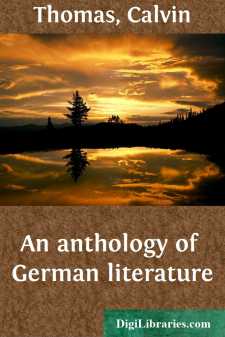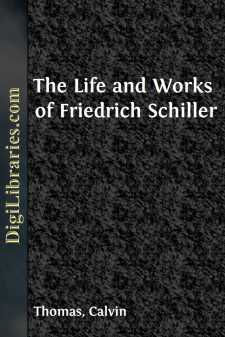Categories
- Antiques & Collectibles 13
- Architecture 36
- Art 48
- Bibles 22
- Biography & Autobiography 813
- Body, Mind & Spirit 141
- Business & Economics 28
- Children's Books 12
- Children's Fiction 9
- Computers 4
- Cooking 94
- Crafts & Hobbies 4
- Drama 346
- Education 46
- Family & Relationships 57
- Fiction 11826
- Games 19
- Gardening 17
- Health & Fitness 34
- History 1377
- House & Home 1
- Humor 147
- Juvenile Fiction 1873
- Juvenile Nonfiction 202
- Language Arts & Disciplines 88
- Law 16
- Literary Collections 686
- Literary Criticism 179
- Mathematics 13
- Medical 41
- Music 40
- Nature 179
- Non-Classifiable 1768
- Performing Arts 7
- Periodicals 1453
- Philosophy 64
- Photography 2
- Poetry 896
- Political Science 203
- Psychology 42
- Reference 154
- Religion 513
- Science 126
- Self-Help 83
- Social Science 81
- Sports & Recreation 34
- Study Aids 3
- Technology & Engineering 59
- Transportation 23
- Travel 463
- True Crime 29
An anthology of German literature
by: Calvin Thomas
Categories:
Description:
Excerpt
PREFACE
This book is designed to accompany an introductory study of the history of German literature. It is assumed that the history itself will be learned, so far as necessary, either from lectures or from some other book devoted to the subject. As the selections were made, for the most part, while I was writing my own short history of German literature for the series published under the general editorship of Mr. Edmund Gosse and known as “Literatures of the World,” it was natural that the Anthology should take on, to some extent, the character of a companion book to the History. At the same time I did not desire that either book should necessarily involve the use of the other. Hence the absence of cross references; and hence also, in the Anthology, the brief introductory notes, giving important dates and summary characterizations. These are meant to enable the student to read the selections intelligently without constant recourse to some other book.
In preparing Part First, I have had in mind the student who has learned to read the language of Goethe and Schiller with some facility, and would like to know something of the earlier periods, but has not studied, and may not care to study, Old and Middle German. On this account the selections are given in modern German translations. The original texts are omitted because space was very precious, and because the book was intended as an aid to literary rather than linguistic study. In making the selections, my first principle was to give a good deal of the best rather than a little of everything. I wished to make friends for medieval German poetry, and it seemed to me that this could best be done by showing it in its strength and its beauty. So I have ignored much that might have had a historical or linguistic interest for the scholar, and have steadily applied the criterion of literary worth.
My second principle was to give preference to that which is truly German, in contradistinction from that which is Latin, or European, or merely Christian. The Latinists of every epoch are in general disregarded, as not being of German literature in the strict sense; yet I have devoted eight pages to Waltharius and three to Rudlieb, on the ground that the matter of these poems is essentially German, albeit their form is Latin. On the other hand, Hrotswith is not represented at all, because, while an interesting personage in her way, she belongs to German literature neither by her form nor by her matter. The religious poetry of the twelfth century receives rather scant attention, partly because it is mostly pretty poor stuff—there is not much else like the beautiful Arnstein hymn to the Virgin, No. XIII—and partly because it embodies ideas and feelings that belonged to medieval Christianity everywhere.
For each selection I have given the best translation that I could find, and where nothing satisfactory could be found in print I have made a translation myself. Where nothing is said as to the authorship of a translation, it is to be understood as my own....



